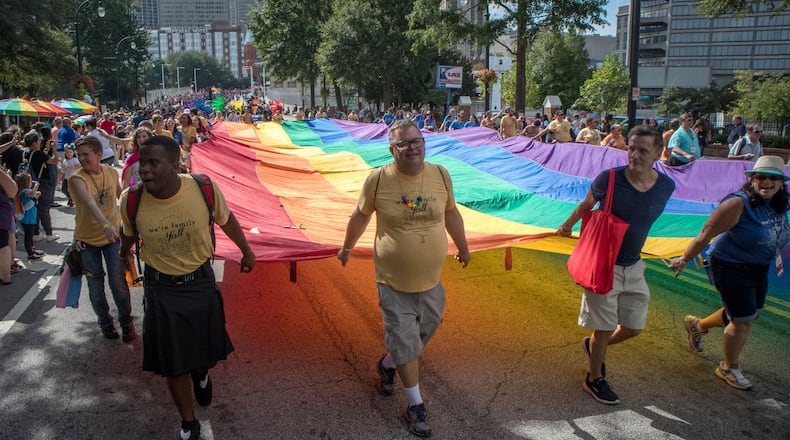When Jeff Cornett marched in his first Atlanta Pride Parade 32 years ago, he was joined by only about 700 other people — a tiny fraction of Sunday’s crowd. Back then, some wore dark sunglasses and masks to hide their identities for fear of losing their jobs.
As that 1985 parade turned from Ralph McGill onto Peachtree Street, participants were met with catcalls from a gaggle of bystanders, according to The Atlanta Journal-Constitution’s coverage of the event. “Go back to ‘Frisco where you belong,” one man yelled.
“It was an act of bravery to march then,” said Cornett, now 55.
He’s participated in every Pride festival since, now joined by his husband. “I couldn’t have fathomed that back in 1985,” he said.
Organizers say they anticipate that this year’s attendance likely will surpass last year’s, which set a record set with an estimated 250,000.
Many of the marchers were representing corporate sponsors both national and local. There were none when Cornett first participated. No politicians, either. This year, every major mayoral candidate had a presence. And so did the current Mayor, Kasim Reed, who seemed more than happy to be there, sans coat and tie, dancing to the beat of the U2 song on the city’s float.
While Pride remains, first and foremost, a celebration of the LGBTQ community and the progress that’s been made, this year’s festivities were not without some dark clouds. The Las Vegas massacre, where 58 people were killed and another 546 injured by a sniper in a nearby high-rise, was on the mind of some participants.
“I can’t say I’m not a little nervous about being in a large crowd like this,” said Cheryl Hemmerle of Avondale Estates. “But I was a lot more nervous marching 25 years ago.”
For others, the specter of the Trump Administration loomed large. Though he promised to be more inclusive than his opponent, Hillary Clinton, on LGBTQ issues, Trump announced in July he was reinstating a ban on transgender soldiers serving in the military. And earlier this month, Attorney General Jeff Sessions issued a religious liberty directive that could impact the LGBTQ workforce. Though court challenges are certain to follow, the directive would allow religious organizations to hire employees based on their beliefs while forcing workers to adhere to “codes of conduct” banning sex outside marriage and same-sex relationships.
“I think you’re seeing way more people get involved this year because of the oppressive (political climate),” said Johns Creek High School senior Nate Fulmer, 17. Johns Creek’s Gay Student Alliance joined sister chapters from about a dozen other suburban Atlanta schools to attend Sunday’s march.
“That wouldn’t have happened last year,” Fulmer said.
Georgia Tech freshman Journey Sherman was also attending her first Pride parade.
“I felt a little more sense of urgency this year,” she said. “I just wanted to be a part of it.”
But Cornett, a gay rights activist for more than three decades, said he’s confident gains made by the LGBTQ movement won’t be rolled back.
“Frankly, I’m more worried about the fate of health care and the environment,” he said.
For others, participation in the parade was more personal.
Sherri Wesley-Burks admitted she was taken aback when her 19-year-old daughter Amaras came out to her as a lesbian in 2013.
“I wasn’t there yet,” said Wesley-Burks, of Atlanta. At first she thought her daughter was being influenced by her friends.
But Wesley-Burks said she’s come around, realizing if she loved her daughter, she had to love who she was. She remembered her uncle, who succumbed to AIDS in 1995 and lived most of his life as a closeted gay man.
“He passed away without ever really being free to be himself,” Wesley-Burks said. “I’m glad my daughter doesn’t have to go through that.”
After turning down her daughter’s invitation to participate in the march for the past three years, Wesley-Burks finally decided to accept.
“When I told her I was coming, she started crying,” Wesley-Burks said. “I knew I had made the right decision.”
About the Author
The Latest
Featured



